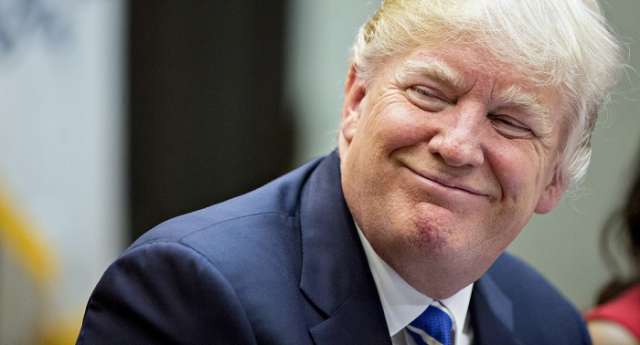Daniels, who sits in Manhattan and is an appointee of President Bill Clinton, also said the issue was one that Congress should police, not the courts.
“As the only political branch with the power to consent to violations of the Foreign Emoluments Clause, Congress is the appropriate body to determine whether, and to what extent, Defendant’s conduct unlawfully infringes on that power,” the judge wrote. “If Congress
determines that an infringement has occurred, it is up to Congress to decide whether to challenge or acquiesce to Defendant’s conduct. As such, this case presents a non-justiciable political question.”
One of the cases dismissed Thursday was filed by Citizens for Responsibility and Ethics in Washington, or CREW, along with a group of employees and owners of hospitality businesses like restaurant and hotels. The other suit, brought as a class action on behalf of members of the public, was filed by an individual New York attorney, William Weinstein.
Daniels concluded that all the plaintiffs lacked standing to sue. He also suggested that if foreign governments were patronizing Trump businesses as a result of his presidency, this wouldn’t amount to a violation of the emoluments clause unless the president encouraged them to do so to receive some benefit from the U.S. government.
“It is wholly speculative whether the Hospitality Plaintiffs’ loss of business is fairly traceable to Defendant’s ‘incentives’ or instead results from government officials’ independent desire to patronize Defendant’s businesses,” the judge wrote. “Even before Defendant took office, he had amassed wealth and fame and was competing against the Hospitality Plaintiffs in the restaurant and hotel business. It is only natural that interest in his properties has generally increased since he became President.”
Daniels said that even if he ordered Trump to refuse any profit from any business with foreign governments, or from state and local governments that the president is not supposed to be paid by while in office, it was unclear how that would help the plaintiffs.
“Were Defendant not to personally accept any income from government business, this Court would have no power to lessen the competition inherent in any patron’s choice of hotel or restaurant,” the judge said.
CREW claimed it had standing because Trump’s failure to divest his businesses had cause the organization to expend resources it would have used elsewhere, but the judge said that claim was too weak to sustain the suit.
The class-action case claimed that Trump was violating promises he made to distance himself from his businesses, but Daniels said that kind of promise wasn’t enforceable in court.
“We would likely be living in a different world if elected officials were legally bound to carry out the political promises they made prior to taking office,” the judge wrote as he dismissed that case. “In our democracy, once a candidate is elected to office, it is for the politicians and the people they represent — not the courts — to decide which campaign promises will be fulfilled and which will become abandoned rhetoric.”
The Justice Department, whose attorneys defended the cases on Trump’s behalf, issued a statement Thursday night welcoming the judge’s action.
“The Department of Justice appreciates the Court’s ruling and its conclusion that Plaintiffs lack standing to pursue these claims in federal court, that Plaintiffs’ claims do not fall within the zone of interests of the Emoluments Clauses, and that Plaintiffs’ claims involve political questions that cannot be resolved in federal court,” said a department spokeswoman, Lauren Ehrsam.
Two similar suits remain pending in other federal courts. One, filed by the State of Maryland and the District of Columbia, is pending before a judge in Greenbelt, Md. The other, filed by nearly 200 Democratic federal lawmakers, was filed in a court in the nation’s capital. The judges assigned to those cases have not yet ruled on similar motions to dismiss them.
One attorney for CREW and the hotel and restaurant plaintiffs, Deepak Gupta, vowed an appeal to the 2nd U.S. Circuit Court of Appeals.
“We respectfully disagree with the district court’s decision,” Gupta said in a statement. “There is no question that there will be an appeal, and our legal team is in the process of exploring our next steps.”
A CREW official called Daniels’ ruling a “setback."
“The Constitution’s emoluments clauses are core protections against destabilizing foreign and domestic corruption. We never thought we would have to sue the president to enforce them,” said Noah Bookbinder, the group’s executive director. “We hoped that President Trump would take the necessary steps to avoid violating the Constitution before he took office. He did not, and we were forced to bring our landmark emoluments case because the plaintiffs in this case — and the American people — have been directly harmed by the president’s violations. While today’s ruling is a setback, we will not walk away from this serious and ongoing constitutional violation.”
Weinstein, the attorney who brought the class-action case, said he was disappointed by the court’s decision. He also said that because Trump set up a trust to hold his businesses while he’s president, the policies he announced amounted to more than a “campaign promise,” as the judge suggested.
“I am in the process of considering my options going forward,” Weinstein added.
Some scholars have questioned whether Trump is subject to the foreign emoluments clause at all, but a footnote in one of Daniels’ opinions Thursday observes that the Justice Department chose to concede that issue as he decided the motions to dismiss the litigation.
More about: #Donald-Trump
















































